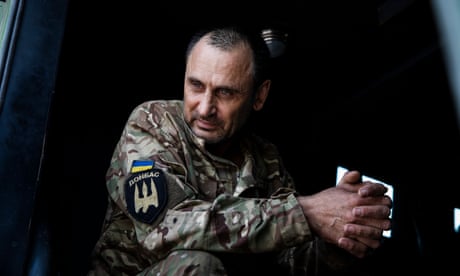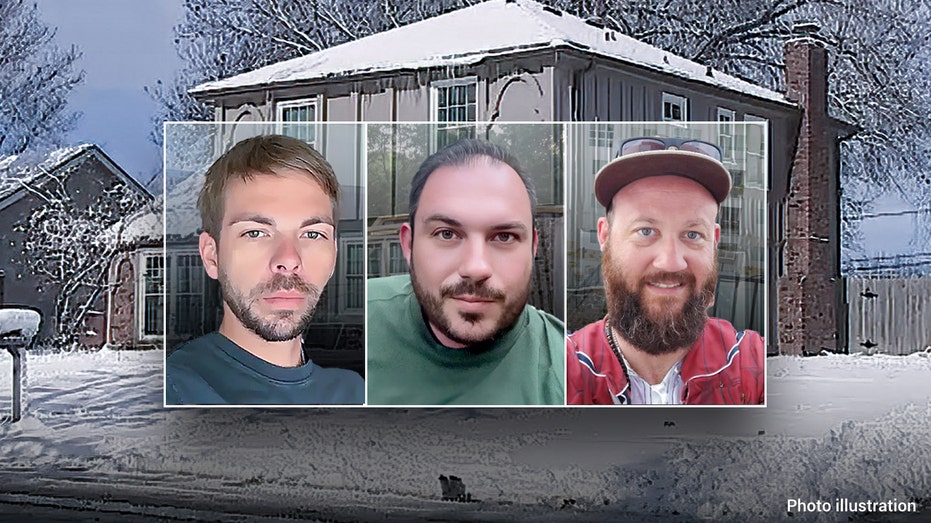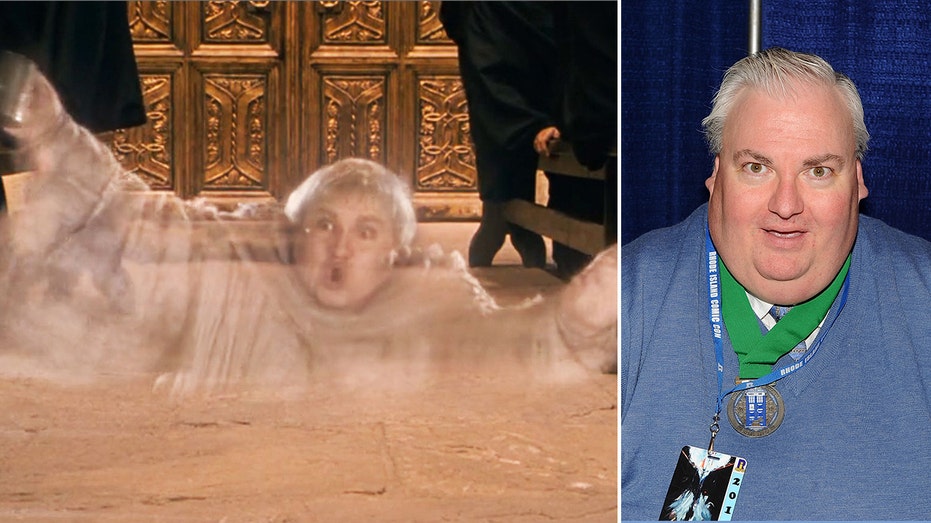- by foxnews
- 11 Mar 2025
‘I believe in our army’: life in Donbas as the frontline creeps closer
‘I believe in our army’: life in Donbas as the frontline creeps closer
- by theguardian
- 06 Jun 2022
- in news

After five grimy days on the frontline, Slava Vladimirovich stripped to his underpants and plunged into the gleaming Torets River. A seagull flapped over the water and willow trees. "Life goes on, even in wartime," Slava said. Wringing out his khaki T-shirt, he added: "In battle there is nowhere to wash."
Slava ran up a muddy embankment and showed off his armoured transporter. On the roof was a joystick-controlled machine gun. Shrapnel had dinted the vehicle's right side. There was a crack in a porthole-like window. "A Russian rocket landed 20 metres from us. We were OK but two civilians got killed," he said.
A member of Ukraine's Donbas battalion, Slava had been evacuating civilians from the beleaguered city of Lysychansk. A couple of kilometres farther north, Ukrainian soldiers were clinging on to the southern chunk of Sievierodonetsk, the last slab of territory in Luhansk province under Kyiv's control.
Slava was optimistic his side would prevail. On Friday Ukrainian forces mounted a counterattack, with fierce street-to-street fighting. "The Russians don't have any reserves or motivation. A country of 140m and they lack infantry!" he said, adding: "Nobody wants to die for Vladimir Putin. He's a bloodthirsty dog."
Putin's 2022 invasion of Ukraine has not quite gone the way the Kremlin anticipated. In February Russian troops failed to encircle and seize the capital and retreated to Belarus. The Russian president's latest war aim is more modest, if still dumbfounding in its ambition: to capture the parts of Donbas not already in separatist hands.
For seven weeks now, Moscow's vast firepower has been concentrated on an eastern theatre in Ukraine's Russian-speaking industrial heartland. Its army is seeking to conquer Sievierodonetsk. The next targets are the cities of Slavyanask, a one-time spa resort, and the garrison town of Kramatorsk. A terrible battle draws near.
Siting on a bench outside Slavyansk's city hall, the deputy mayor Yuriy Pidlisnyi said he had told residents to flee. About 25,000 people out of its approximate 100,000 population had stubbornly ignored his advice, he said. Some were elderly and didn't want to go. Others pleaded sick relatives or much-loved cats.
Conditions inside the city are getting steadily worse. There is no gas or water, and only intermittent electricity. With petrol expensive, many residents get around on bikes. Some who left have come back after running out of money. The local economy is trashed. Soldiers queue outside a market cafe to buy cost-price 60 Hryvnia [�1.80] kebabs.
The frontline, meanwhile, creeps ever closer. The Russians started bombarding the city in late April, the deputy mayor said. They were now 12km away. "The've hit us with rockets, airstrikes and ballistic missiles," he added. The enemy had shelled Svyatohorsk Lavra, north of Slavyansk, killing a nun and burning down the wooden All Saints monastery.
The omens were grim. Might Slavyansk avoid the tragic fate of Mariupol and other Ukrainian urban areas which the Russians had flattened and then overrun? "I believe in our army. I hope there are enough forces," Pidlisnyi said. "Russia has an imperial complex. Putin thinks he doesn't have much time left."
In the distance was a loud thump. And then another. The noise came from outgoing Ukrainian artillery, Pidlisnyi said. "If it's incoming you feel it in your legs. The ground vibrates." He broke off to make a short phone call. One of his staff sounded the air raid siren, which blared across the city from his office roof.
In spring 2014 a Russian militia seized the administration building and occupied Slavyansk for three months. It was a time of terror and kidnappings. Pidlisnyi described the separatists as "drunks, drug addicts and the lumpenproletariat". A minority in Slavyansk sympathised with Russia, he said, while ethnic Russians backed Ukraine.
As the city's fate hung in the balance, death rained down from the sky. Last week three people were killed and several injured when a night-time rocket slammed into Yaroslav the Wise street. The neighbourhood was a giddy mess. A burnt-out Lada sat in the road. The blast blew out balconies and splattered walls. Glass showered a communal garden.
Worst-hit was apartment block number 10, where Vitaly Kolesnichneko was asleep with his wife, Neliya. "We live on the third floor. It was dark. There was a huge explosion. It blew off the bathroom door. I saw yellow and green smoke," he recalled. He added: "I looked for my wife. She had gone very quiet. She said: 'My legs, my legs.'"
Vitaly, who walks with a stick, said he tried to drag his wife out. Rescue workers took her away. She died on her way to hospital in Kramatorsk. "We were married for one month short of 30 years," he said, showing a photo of Neliya on his phone. A 21-year-old soldier living across the hall was killed, he said, and the nearby school damaged.
On the fifth floor at number 10 was another scene of heartbreak. Alyona Boivet and her husband, Viktor, left Slavyansk on 6 April, shortly after their register office marriage. They had not been back since. On Sunday Alona's mother, Oksana, returned to the couple's shattered apartment. Sobbing, she retrieved her daughter's wedding dress and shoes.
Her sister Tatiana comforted her while male family members tried to patch up a busted 2-metre-long frame. Through the open window you could see swifts, screeching across a sultry summer sky. "I want to live in my own country. It's ours. We love Ukraine. We don't want to be in Russia," Tatiana said. "We hope God will look after us."
"The mayor's office should send a commission to value the damage and help us but they haven't," another resident Elena Voitenko said. "And then Russia should pay for all of this. I am ethnic Russian but my homeland is Ukraine." She added: "I didn't ask them to come here. My daughter lives in the DNR [Donetsk People's Republic] and is zombified. We can't talk any more."
On the road to the frontline, military traffic rolled past a landscape of green wheat fields and slag-heaps. There were armoured personnel carriers, fuel trucks, engineering units and civilian vehicles painted in military green. One convoy had broken down; a sergeant bashed a tank tread with a hammer. Soldiers waited in the afternoon sunshine.
There was no sign of the gamechanging long-range multiple launcher systems promised by the US administration. The impression was of a medium-size army doing its valiant best against a mighty foe. "Now it's a lot of rockets and artillery," Maksym, a Ukrainian commander, said. "In 2014 the Russians didn't want people to know them. It had to look like DNR."
Back at the Torets River, Slava said he came from Popasna, a town in Luhansk. He signed up to fight in 2014, joining a volunteer battalion that later became a part of the national guard. He re-enlisted in February. Russians forces recently swallowed up Popasna and were trying to join up with the Seversk, to the north, cutting Ukrainian supply lines.
"Why did God punish me by making me be born here?" Slava asked wryly. "I liberated Popasna and Lysychansk eight years ago and took part in the biggest battles. And then the Russians came back to us again." Russia was advancing on the same axis, just west of Slavyansk, where the Red army fought the Germans during the second world war, he pointed out.
Could Ukraine win? And what might victory look like? "A difficult question. How can you talk about victory if 50,000 people lie dead. War is absolute madness," he said.
- by foxnews
- descember 09, 2016
High-end vacation resort bans children to achieve 'tranquil environment'
The Alila Marea Beach Resort, located in Encinitas, California, has announced that it's no longer accepting kids and is transitioning to an adults-only vacation spot.
read more


